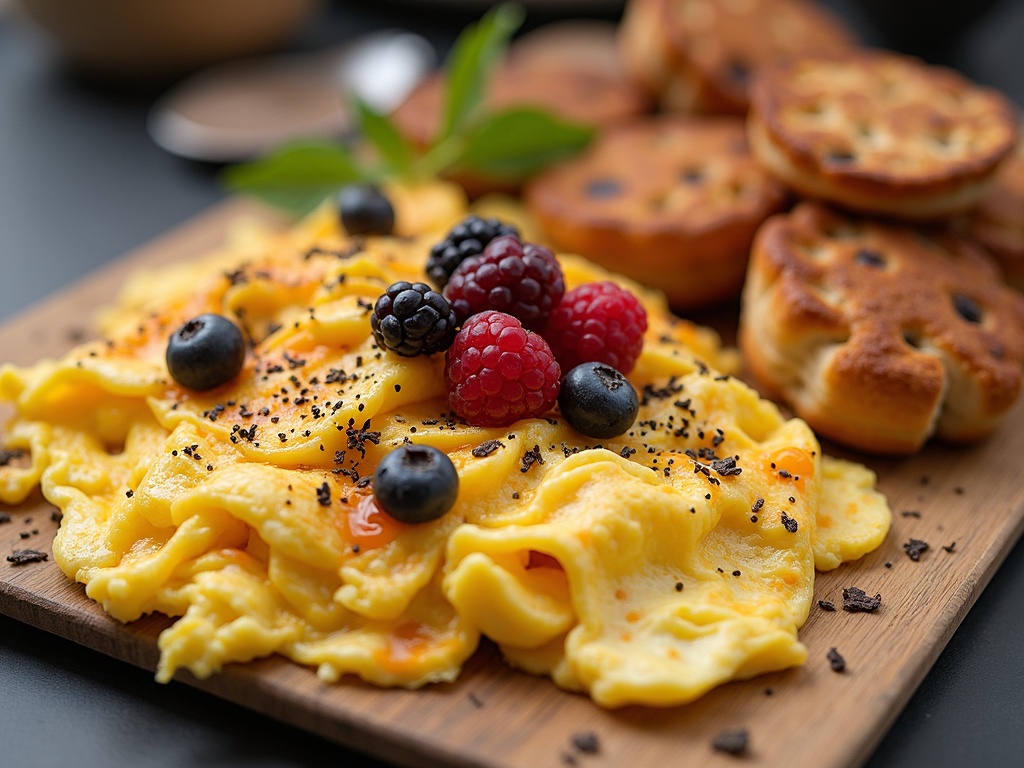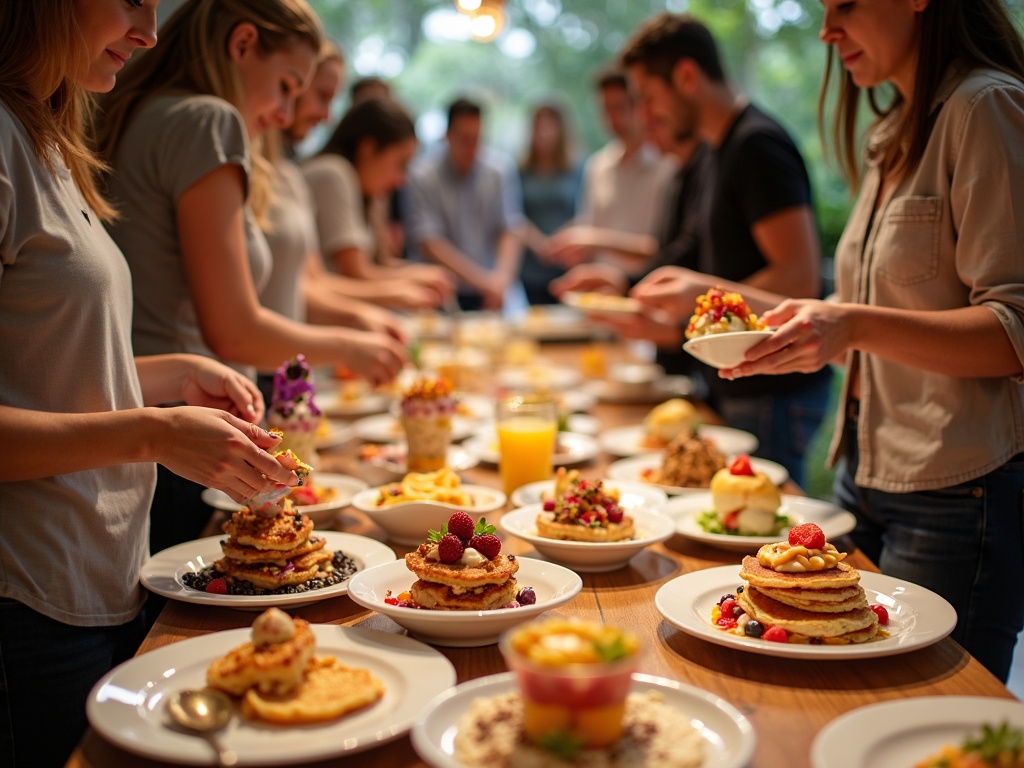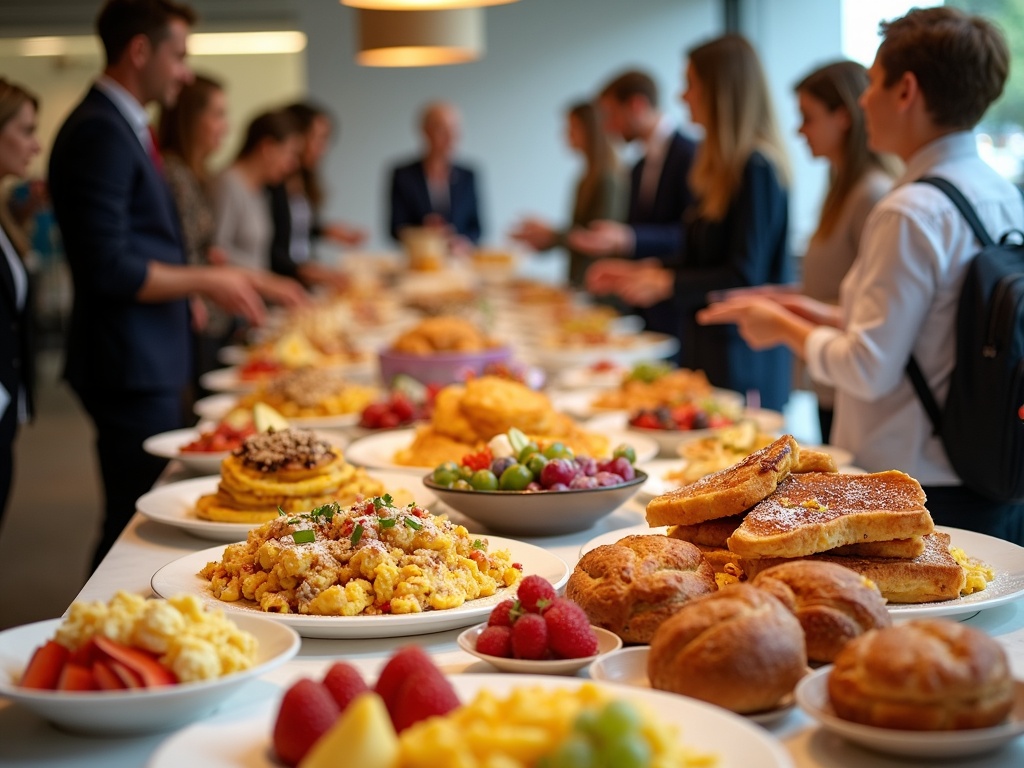Breakfast catering has surged as a major business trend, with the market hitting $20 billion in 2022 and growing 4.5% annually. Companies now recognize that morning meals deliver measurable benefits like higher employee productivity, better morale, and stronger team connections.
Find In This Article
Key Takeaways
- Companies that offer breakfast catering report 70% higher employee productivity levels, making it a smart business investment.
- Popular breakfast catering formats include full-service buffets, individually packaged boxed breakfasts, and cost-effective continental options.
- Breakfast catering costs range from $8-$25 per person, offering better value compared to lunch or dinner alternatives.
- Healthy options have seen remarkable growth, with 51% of consumers preferring nutritious breakfast selections at catered events.
- Technology has transformed the industry through online ordering systems, delivery tracking, and customizable menus that simplify the administrative process.
Why Breakfast Catering is Booming in Business
Breakfast catering has seen remarkable growth in recent years, with the market size reaching an impressive $20 billion in 2022. This segment continues to expand at a healthy 4.5% annual growth rate, making it one of the fastest-growing sectors in the food service industry.
I’ve noticed companies are increasingly recognizing the value of providing breakfast for their teams. It’s not just about the food—it’s about creating an environment where employees feel valued and energized to start their day. The numbers back this up: 70% of companies that offer breakfast report higher employee productivity levels.
Popular Breakfast Catering Options
The corporate world has embraced various breakfast catering formats to suit different needs and occasions. When planning your next office breakfast, consider these popular options:
- Full-service buffets: Perfect for important meetings or company-wide gatherings, these setups include hot items like egg dishes, breakfast meats, and sometimes made-to-order stations.
- Boxed breakfasts: Individually packaged meals that have gained popularity since the pandemic, often including items like yogurt parfaits, fruit, and pastries or baked oats.
- Continental options: A cost-effective choice featuring pastries, bagels, fruit platters, and french toast that works well for casual team gatherings.
The surge in breakfast catering isn’t happening by chance. There’s been a significant shift in corporate culture toward prioritizing employee satisfaction and wellness. Companies have discovered that investing in quality morning meals creates a positive atmosphere and fosters team bonding.
Morning meetings feel more productive when paired with a spread of savory oatmeal and other breakfast favorites. I’ve found that teams are more engaged and creative when they’ve had a proper breakfast to fuel their brains.
The variety available in breakfast catering has expanded beyond traditional continental fare. Many caterers now offer globally-inspired options like ube mochi pancakes alongside classic favorites, accommodating diverse dietary preferences including vegetarian, vegan, gluten-free, and halal options.
What’s particularly interesting is how breakfast catering has become a competitive advantage in the corporate world. Companies use it as a recruiting and retention tool, especially in industries with fierce talent competition. Job candidates often cite workplace perks like catered meals as influential factors when choosing between offers.
The economics make sense too. The cost of providing breakfast is relatively modest compared to the benefits in productivity, reduced tardiness, and improved morale. For many businesses, it’s an investment that pays measurable dividends.
Technology has also transformed how breakfast catering works. Online ordering systems, delivery tracking, and customizable menus have made it easier for businesses to provide breakfast regularly without administrative headaches.
Looking ahead, the breakfast catering trend shows no signs of slowing. As more companies adopt hybrid work models, those in-office days become more important for team building and collaboration—with breakfast serving as the perfect opportunity to bring people together.
For companies considering adding breakfast catering to their employee benefits, the data suggests it’s a smart business move that supports both company culture and bottom-line results.
What’s on the Menu: Popular Catering Choices
I’ve found that a well-planned breakfast catering menu can make or break your event. Whether you’re planning a corporate meeting or family gathering, selecting the right breakfast items ensures everyone starts their day satisfied and energized.
Hot and Fresh Favorites
Hot breakfast items remain the cornerstone of any successful catering menu. Fluffy scrambled eggs are universally appealing and can be customized with various toppings like cheese, herbs, or vegetables. They’re also incredibly versatile for accommodating different dietary preferences.
Nothing draws people to the breakfast table like a stack of golden French toast or pancakes. For something unique, consider offering ube mochi pancakes – they’re Instagram-worthy and deliciously different from standard fare. Pair these sweet treats with savory protein options like chicken or turkey sausages and halal beef alternatives to traditional bacon.
Fresh pastries add a touch of bakery-fresh goodness to any catering spread. Assorted muffins in flavors like blueberry, banana nut, and chocolate chip are always crowd-pleasers. Buttery croissants and fruit-filled danishes round out the pastry selection nicely, giving guests options to mix and match with other breakfast items.
The healthy breakfast segment has seen remarkable growth in recent years. In fact, 51% of consumers now prefer healthy breakfast options when attending catered events. A thoughtful selection of savory oatmeal variations, yogurt parfaits with fresh berries, and protein-packed baked oats will satisfy health-conscious guests without sacrificing flavor.
Fresh fruit salads featuring seasonal options are essential for any catering menu. They provide a refreshing counterpoint to heavier items and accommodate nearly all dietary restrictions. Consider adding granola and nut butter options as toppings to create a build-your-own parfait station.
The modern breakfast catering landscape has shifted significantly to accommodate dietary restrictions. Nearly half (48%) of consumers now demand gluten-free or vegan choices at catered events. Smart caterers are responding with alternatives like gluten-free muffins, vegan egg dishes made with tofu, and dairy-free yogurt options.
No breakfast catering menu is complete without a thoughtful beverage selection. Freshly brewed coffee remains the most requested item, preferably offered with both dairy and non-dairy milk options. Hot tea with various flavor options appeals to non-coffee drinkers, while a selection of fruit juices (orange, apple, cranberry) provides cold alternatives.
For larger events, I recommend setting up dedicated beverage stations separate from food to prevent bottlenecks. Consider offering specialty options like cold brew coffee or freshly pressed juices for an upscale touch that guests will remember.
The most successful breakfast catering menus strike a balance between comfort and innovation. Classic items like scrambled eggs and pastries provide familiar options for conservative eaters, while creative additions like global-inspired breakfast bowls or seasonal specialties keep the menu fresh and exciting.
When planning quantities, I calculate about 1.5 servings per person to ensure nobody leaves hungry. It’s always better to have a slight surplus than to run short, particularly for hot items and beverages which tend to be consumed in greater quantities than expected.

Smart Money: The Cost Benefits of Breakfast Catering
I’ve found that breakfast catering offers impressive value compared to other meal options when hosting business meetings or events. The investment ranges from $8-$25 per person, with several factors influencing where your costs fall within this spectrum. This price range makes breakfast catering particularly attractive when compared to lunch or dinner alternatives.
Understanding the Real Numbers
Traditional meeting refreshments—the standard coffee, juice, and pastry setup—typically cost around $15 per person without including full catering services. When you factor in the convenience and professionalism of a catered breakfast, the slight premium often pays for itself.
According to industry data, 47% of businesses allocate significant portions of their hospitality budgets specifically to catering expenses. This widespread adoption suggests companies recognize the value proposition breakfast events offer.
The cost benefits become even more apparent when you consider:
- Bulk purchasing discounts that catering companies leverage
- Reduced food waste compared to self-organized options
- Time savings for your team (no setup or cleanup)
- Professional presentation without additional equipment purchases
I’ve noticed that many catering companies offer tiered pricing options for breakfast items like French toast or egg dishes, allowing you to customize the experience based on your specific budget constraints.
Maximizing Value While Controlling Costs
Smart planning can significantly enhance your breakfast catering experience while keeping costs manageable. Consider these strategic approaches:
First, focus on timing. Early morning meetings (7:00-8:30 AM) often have lower minimum order requirements from caterers due to their scheduling preferences. This timing also sets a productive tone for the day.
Second, consider menu selection carefully. Continental breakfast options featuring pastries, fruit, and beverages typically run $8-12 per person, while hot breakfast buffets with items like specialty pancakes or custom egg stations range from $15-25 per person.
For longer meetings, incorporating filling options like savory oatmeal or baked oats can eliminate the need for mid-morning snack service, effectively combining two catering charges into one.
I’ve also found that negotiating package deals for recurring meetings can lead to substantial savings—many caterers offer 10-15% discounts for booking multiple events simultaneously.
By balancing service levels with thoughtful menu planning, breakfast catering delivers excellent return on investment. The combination of lower per-person costs, time efficiency, and professional presentation makes morning meetings both productive and cost-effective.
When you consider the alternatives—having team members handle food preparation or sending everyone out for individual meals—the structured approach of professional breakfast catering typically delivers superior economic and experiential outcomes for organizations of all sizes.
Making Your Event Stand Out
I’ve seen firsthand how the right breakfast catering transforms ordinary gatherings into memorable experiences. Whether you’re planning a corporate function or weekend celebration, breakfast offerings can set the perfect tone for your event.
Elevating Different Event Types
Corporate meetings gain serious momentum when fueled by thoughtful morning fare. Rather than the standard coffee and donuts, consider interactive stations where attendees can customize their baked oats with various toppings or build personalized breakfast bowls. This approach doesn’t just satisfy hunger—it sparks conversation and enhances engagement throughout your sessions.
Weekend weddings have increasingly shifted toward breakfast and brunch receptions. This trend offers several advantages:
- Lower venue costs compared to evening events
- Fresh, bright atmosphere for photography
- More relaxed, conversational guest experience
- Opportunity for unique food presentations like ube mochi pancakes or build-your-own parfait stations
Networking events benefit from strategic breakfast catering choices. I recommend focusing on easy-to-eat options that don’t interrupt conversation flow. Mini French toast skewers, breakfast sliders, and fruit cups allow guests to mingle while enjoying something substantial. For morning networking functions, I’ve found that offering both traditional and savory oatmeal options caters to diverse preferences while creating natural conversation starters.
Educational seminars present unique opportunities to combine learning with networking. Strategic breakfast timing can maximize both elements:
- Pre-session light fare encourages early arrival and networking
- Mid-morning egg dishes during breaks revitalize attention spans
- Post-session brunch extends discussion and connection opportunities
I’ve noticed that catering success comes down to alignment with your event goals. When planning morning-focused gatherings, consider how the food service timing, presentation style, and menu variety can actively support your desired outcomes rather than simply feeding attendees.

The Future of Breakfast Catering
The breakfast catering industry is evolving rapidly with several key trends shaping its future. I’ve noticed a significant shift in consumer preferences that’s transforming how caterers approach their breakfast offerings.
Consumer-Driven Evolution
Environmental consciousness has become a major factor in catering choices. Research shows that 41% of consumers are willing to pay more for eco-friendly breakfast options. This has prompted caterers to incorporate sustainable practices like using biodegradable serveware and reducing food waste.
Personalization is another crucial trend, with 65% of customers preferring customized menus that accommodate dietary restrictions. Modern breakfast caterers now routinely offer:
- Plant-based alternatives to traditional egg dishes
- Gluten-free options like mochi pancakes and rice-based cereals
- Low-sugar variations of classics like French toast
- Protein-rich choices such as savory oatmeal bowls
Technology integration has transformed how breakfast catering services operate. Mobile apps and online platforms now allow clients to browse menus, place orders, customize selections, and track deliveries in real-time. These digital tools have made the ordering process more efficient while providing valuable data on customer preferences.
Sustainability extends beyond just the food itself. Forward-thinking caterers are prioritizing eco-friendly packaging solutions and sourcing ingredients locally. This approach reduces carbon footprints while supporting regional economies. Many caterers highlight their relationships with local farms and producers as a selling point.
Creative presentation has also gained importance. Instagram-worthy breakfast spreads featuring innovative options like baked oats bars and colorful smoothie stations are replacing standard continental setups. These visually appealing displays create memorable experiences that enhance the perceived value of catering services.
The future of breakfast catering lies in balancing these emerging trends with the timeless appeal of morning comfort foods. By embracing sustainability, personalization, technology, and creativity, caterers can meet evolving consumer expectations while delivering memorable morning dining experiences.
Sources:
IBISWorld, Catering Industry Report
National Restaurant Association, Culinary Forecast 2022
Statista, Breakfast Brunch Market in the US
Mintel, Eating Out Review 2023

